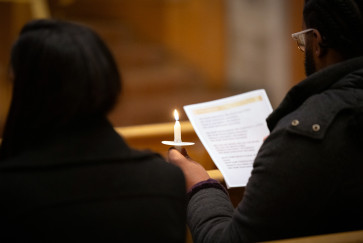The Gender-Queer, Non-Binary, Transgender (GQNBT) Task Force presented its findings to the Provost’s Office at a meeting yesterday (Feb. 18) and recommended seven priority areas of action to enhance Northwestern’s efforts to make the University a safe and welcoming place for all of its students, faculty and staff.
Those recommendations include giving early attention, especially, to the areas where Northwestern can be:
- Respecting and affirming names and identity, and including this information in campus systems
- Creating a gender-inclusive learning and working environment by promoting resources currently available
- Creating gender-inclusive residential services and promoting information about current gender-open housing options
- Expanding gender-inclusive facilities, and promoting their locations, including all-gender bathrooms
- Expanding health services and supporting well-being and posting information about these online
- Strengthening community, connection and collaboration, creating a central webpage to list resources
- Increasing University resources, including bolstering support for existing groups and resources
The GQNBT Task Force convened during the 2018 – 2019 academic year to explore how Northwestern University could better support the success of gender-queer, non-binary and/or transgender students, faculty and staff.
While gender identity nomenclature is evolving, the terms “trans and gender non-conforming” are used in the report as the gender identity labels of choice requested by task force members who belong to the target populations. The report also uses the term “all-gender” (rather than other terms such as “open gender” or “gender neutral”) to refer to facilities that are or that are recommended to be all-gender inclusive.
Sponsored by Provost Jonathan Holloway, late Vice President for Student Affairs Patricia Telles-Irvin and former Vice President for Human Resources Pam Beemer, the group met monthly from October to June to discuss a wide range of issues that are relevant to promoting the well-being of trans and gender non-conforming students, faculty and staff. The task force assessed the current landscape to identify gaps in policies and resources, and recommended strategies that will facilitate a more accessible, safe and welcoming campus environment.
The task force was led by co-chairs Sekile M. Nzinga, director of the Women’s Center and lecturer in gender and sexuality studies; and Héctor Carrillo, professor of sociology, and gender and sexuality studies, and co-director of the Sexualities Project at Northwestern (SPAN). Nzinga, recently named interim chief diversity officer and associate provost for diversity and inclusion, presented the findings of the report to the Provost’s Office.
“This report represents the first systematic and comprehensive attempt to consider all the implications of trans and gender non-conforming issues for the entire Northwestern community,” Carrillo said. “We thank our task force membership — more than 70 Northwestern staff, students, faculty and alumni — for their dedication. We also thank our institutional sponsors, including Provost Holloway, for their support.
“We trust that steady progress in implementing the report’s recommendations, over the months and years to come, can greatly contribute to institutional and cultural change at Northwestern and improve the well-being and quality of life of the trans and gender non-conforming members of our diverse community,” he added. “We hope that our recommendations will be embraced by the many administrative units whose cooperation is needed to make our University a more welcoming and equitable place in terms of gender diversity.”
The group set out to address three main objectives during its work:
- To identify key challenges faced by gender-queer, non-binary, transgender and transitioning individuals at Northwestern
- To review existing data and information available about the gender-queer, non-binary and transgender population and their needs
- To submit a report on findings and recommendations to better support the success of gender-queer, non-binary and transgender individuals
The yearlong effort resulted in a report which highlights the seven prioritized recommendations listed above, along with their related thematic summaries, and it proposed actions and considerations for implementation. To review those updates in more detail on the task force website, please go here.
In addition, the report contains background information on prior gender-inclusive initiatives at Northwestern, examples from other institutions and additional suggested readings.
The report includes an appendix with the Student-Led Survey Report by Northwestern student leaders, whose work enlightened and supplemented the work of the task force.
“We owe a great credit to our queer, trans and non-binary student leaders who independently implemented a student survey in tandem to the task force,” said Nzinga. “Their work provided an opportunity for trans and gender non-conforming undergraduate, graduate and professional students to share their lived experiences of navigating gender inequity and marginalization here at Northwestern.
“Their compelling findings bolstered and informed our task force report and should inspire our campus community to work together towards a more affirming and equitable Northwestern for our gender expansive students,” she added. “I look forward also to learning more about the specific gender inclusive needs of our trans and non-binary staff and faculty as we move towards the planning and implementation stages of this critical institutional work.”
The University will work on implementing the seven priority areas starting in the winter and spring quarters in order to help support the success of Northwestern’s gender-queer, non-binary and transgender community members. More details will be released as they become available.
As Northwestern University continues to evolve and become more inclusive, it is imperative to cultivate and nurture an equitable environment where everyone is safe and feels welcome. The meticulous and comprehensive nature of these recommendations will help to ensure the success of our collective efforts towards these ends. Please go here to access a PDF of the full report.

